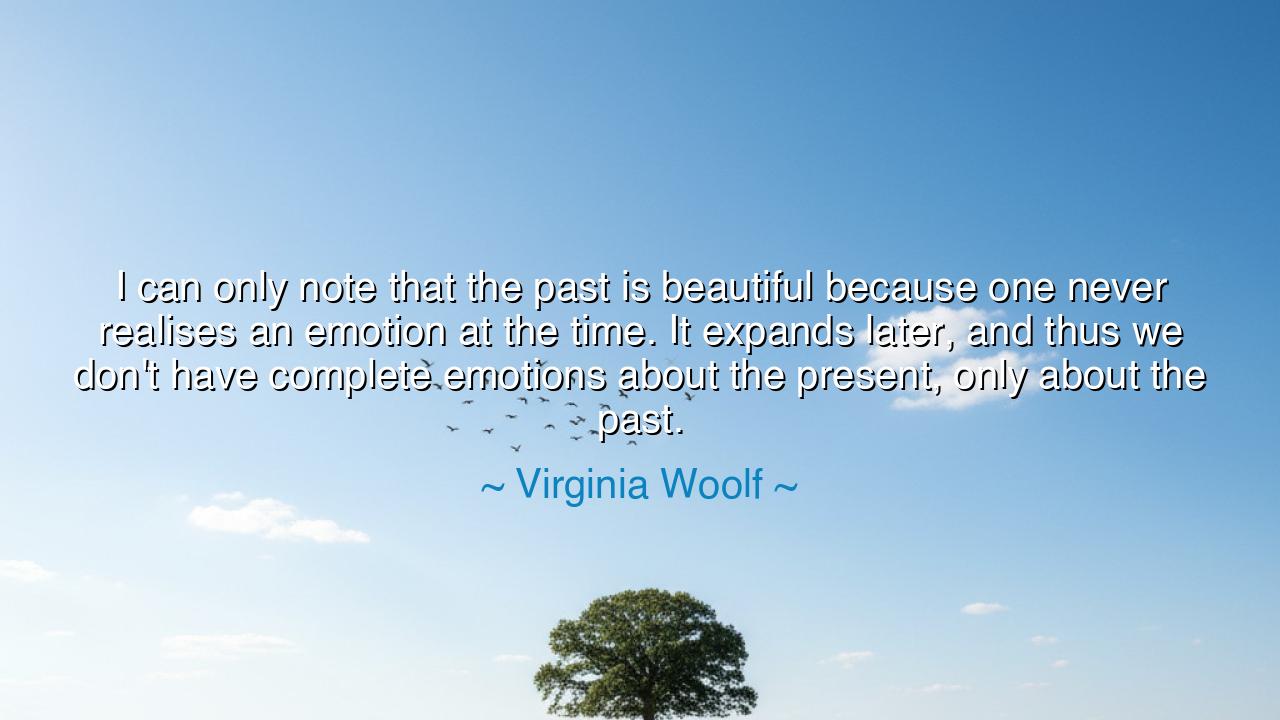
I can only note that the past is beautiful because one never
I can only note that the past is beautiful because one never realises an emotion at the time. It expands later, and thus we don't have complete emotions about the present, only about the past.






The words of Virginia Woolf—“I can only note that the past is beautiful because one never realises an emotion at the time. It expands later, and thus we don't have complete emotions about the present, only about the past.”—carry the weight of profound human truth. They remind us that the heart often lags behind the moment, that life as it is lived feels incomplete, fleeting, elusive. Only when time has passed, when the present has turned into memory, do we truly grasp the depth of what we have felt. The past, then, becomes not just recollection but a canvas where emotions reveal their full color.
To the ancients, memory was sacred. The Greeks personified it as Mnemosyne, the mother of the muses, for they knew that art, poetry, and wisdom were born out of remembrance. Woolf touches the same eternal chord. She tells us that the present moment, though lived, is not fully understood until it has slipped away. Our laughter, our sorrow, our longings—all seem half-formed in their immediacy, but in reflection, they expand, deepen, and acquire beauty. The heart requires distance to comprehend its own depths.
History offers us countless witnesses to this truth. Consider Anne Frank, who during her confinement in the Secret Annex, recorded daily thoughts in her diary. To her, those days were filled with tension, monotony, and fear. Yet when we look back through her words, those same days gleam with tragic beauty, infused with courage, innocence, and humanity. What she could not fully grasp as she lived became, in the past, a treasure for the world—an emotional truth that has expanded far beyond her moment.
Or think of the soldier returning home from war. In the battlefield, he feels only exhaustion, hunger, and fear. Yet years later, when he recalls his comrades, their laughter amid danger, their shared burdens, he feels an aching beauty in those memories. The present gave him survival, but the past gives him meaning. So too with us: we rarely recognize the sacredness of our moments while they unfold, but later, looking back, we see their richness, their fragility, their worth.
Beloved listener, the lesson is clear: do not curse the fleeting nature of time. Understand instead that the heart is slow to recognize its treasures. Be patient with yourself when you feel the present lacks fullness, for its true depth will unfold later. What seems ordinary now may be revealed as extraordinary when it lives again in memory. The beauty of life often lies not in the moment itself, but in the expansion of that moment as we carry it forward.
Yet this does not mean we should live carelessly. Woolf’s wisdom urges us to dwell more attentively in the present, to gather moments like flowers, even if their fragrance is not yet known. Walk slowly, listen deeply, cherish the touch of those you love, though you may not yet feel its full weight. For when the present has passed, it will return to you magnified, and the beauty you once overlooked will rise like a tide in your soul.
Practical wisdom is this: keep a journal, write letters, hold conversations that matter, and look closely at the small details of daily life. These practices anchor the fleeting present, giving your future self the keys to unlock the beauty of the past. Remember always that emotions expand with time. Today’s simple moment may tomorrow be revealed as sacred, and what seems now incomplete will one day sing with fullness.
So let Virginia Woolf’s words guide you. Do not despair that the present feels unfinished. Live it with care, and let memory do its holy work. For one day, when you look back, you will see that the past is beautiful—not because time has changed it, but because your heart has finally grown large enough to understand.






AAdministratorAdministrator
Welcome, honored guests. Please leave a comment, we will respond soon